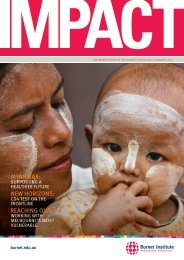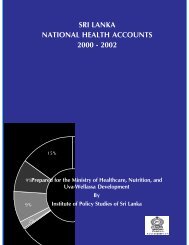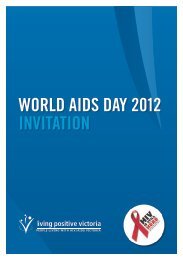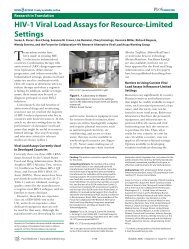Illicit Drug use in the Asia Pacific Region - Burnet Institute
Illicit Drug use in the Asia Pacific Region - Burnet Institute
Illicit Drug use in the Asia Pacific Region - Burnet Institute
Create successful ePaper yourself
Turn your PDF publications into a flip-book with our unique Google optimized e-Paper software.
Situational analysis of illicit drug issues and responses <strong>in</strong> <strong>the</strong> <strong>Asia</strong>–<strong>Pacific</strong> region<br />
386<br />
B3 .11 The <strong>Pacific</strong><br />
NZAID<br />
1 . The UNICEF partnership with NZAID is for<br />
$NZ 2 million over three years (start<strong>in</strong>g this<br />
f<strong>in</strong>ancial year) and will <strong>in</strong>clude fund<strong>in</strong>g for<br />
three key UNICEF programs: an Expanded<br />
Programme of Immunisation; Prevention<br />
of Mo<strong>the</strong>r-to-Child Transmission of HIV;<br />
and <strong>Pacific</strong> Youth Health and Development<br />
(elaborated on below) .<br />
<strong>Pacific</strong> Youth Health and Development foc<strong>use</strong>s<br />
on three ma<strong>in</strong> components: peer education<br />
through master tra<strong>in</strong>ers at community level,<br />
<strong>in</strong>tegration of <strong>the</strong> curriculum <strong>in</strong>to <strong>the</strong> primary<br />
and high school curricula, and communication<br />
activities . The program objective is to build up<br />
<strong>the</strong> life skills of at least 20 per cent of young<br />
people (80,000 of <strong>the</strong> 400,000 young people<br />
aged between 15 and 24 years old) <strong>in</strong> <strong>the</strong> 14<br />
<strong>Pacific</strong> Island countries covered by UNICEF;<br />
<strong>in</strong>tegrate life skills <strong>in</strong>to late primary and high<br />
school curricula and develop creative communication<br />
materials to re<strong>in</strong>force skills build<strong>in</strong>g for<br />
young people and HIV/AIDS prevention .<br />
2 . STI/HIV and Development Program aims<br />
to <strong>in</strong>crease <strong>Pacific</strong> Island capacity for a more<br />
effective and susta<strong>in</strong>able response to <strong>the</strong><br />
spread of HIV/STI and <strong>the</strong> care for those with<br />
AIDS . The program takes a multi-dimensional<br />
approach to HIV/STI, giv<strong>in</strong>g recognition to<br />
economic and social development issues<br />
(<strong>in</strong>clud<strong>in</strong>g governance, employment, poverty,<br />
gender equality and <strong>the</strong> impact on children<br />
and families) . The project is managed by<br />
UNDP through <strong>the</strong> Suva office, work<strong>in</strong>g with<br />
<strong>the</strong> UN regional programs based <strong>in</strong> both Fiji<br />
and Samoa . NZAID has committed $600,000<br />
to <strong>the</strong> <strong>in</strong>itiative, end<strong>in</strong>g next f<strong>in</strong>ancial year .<br />
A range of project activities have been undertaken,<br />
<strong>in</strong>clud<strong>in</strong>g a number of workshops and<br />
tra<strong>in</strong><strong>in</strong>g sessions on HIV/AIDS and STIs for<br />
key health workers and government officials,<br />
research surveys on key HIV/AIDS and STI<br />
issues <strong>in</strong> <strong>the</strong> <strong>Pacific</strong>, national legislative<br />
reviews, counsell<strong>in</strong>g for people liv<strong>in</strong>g with<br />
HIV/AIDS and <strong>the</strong>ir families, weekly newspaper<br />
columns on HIV/AIDS prevention,<br />
condom distribution through NGOs, and <strong>the</strong><br />
development of curriculum materials . Alongside<br />
project activities, <strong>the</strong> program has also<br />
supported a full-time UNAIDS coord<strong>in</strong>ator<br />
position located <strong>in</strong> Suva . NZAID’s fund<strong>in</strong>g for<br />
this program will end next f<strong>in</strong>ancial year .<br />
3 . Mascul<strong>in</strong>ity, Mental Health and Violence<br />
(MMHV) project aims to: ‘reduce <strong>the</strong> grow<strong>in</strong>g<br />
trend of young <strong>Pacific</strong> men us<strong>in</strong>g violence<br />
to deal with depression and assert <strong>the</strong>ir<br />
mascul<strong>in</strong>e power’ . The project is managed<br />
by <strong>the</strong> Foundation of <strong>the</strong> Peoples of <strong>the</strong><br />
South <strong>Pacific</strong> (FSPI) . The MMHV project is<br />
carried out <strong>in</strong> Kiribati, Vanuatu, Fiji and<br />
Papua New Gu<strong>in</strong>ea, through FSPI affiliate<br />
NGOs . NZAID has committed $1,176,410<br />
to <strong>the</strong> <strong>in</strong>itiative over three f<strong>in</strong>ancial years,<br />
end<strong>in</strong>g <strong>in</strong> 2006–07 .<br />
All four NGOs have completed <strong>the</strong>ir situation<br />
analyses (SA) focus<strong>in</strong>g on young<br />
men and mental health, which will <strong>in</strong>form<br />
<strong>the</strong> target groups, types of activities and<br />
promotion/advocacy strategy for <strong>the</strong><br />
project . The SA <strong>in</strong>cludes a literature review,<br />
stakeholder <strong>in</strong>terviews, community action<br />
participatory process consultations (CAPP)<br />
and a knowledge, attitude and practice<br />
(KAP) survey . The CAPP process was adopted<br />
from a Papua New Gu<strong>in</strong>ea model titled<br />
‘Promot<strong>in</strong>g Health through Community<br />
Action Participation’ orig<strong>in</strong>ally developed<br />
by <strong>the</strong> Papua New Gu<strong>in</strong>ea Department of<br />
Health’s Health Promotion Branch and <strong>the</strong><br />
Women’s and Children’s Health Project,<br />
funded by AusAID . A fur<strong>the</strong>r process utilised<br />
by <strong>the</strong> Vanuatu Red Cross Society was also<br />
<strong>in</strong>tegrated <strong>in</strong>to <strong>the</strong> process when target<strong>in</strong>g<br />
non-traditional sett<strong>in</strong>gs . This approach has<br />
been documented and both successes and<br />
lessons learnt will be documented <strong>in</strong> a model<br />
which <strong>the</strong> project hopes to share with <strong>the</strong><br />
whole <strong>Pacific</strong> Island region .<br />
F<strong>in</strong>al SA drafts will be completed between<br />
<strong>the</strong> end of February and end of March with<br />
work plans for activities and commencement<br />
of same to beg<strong>in</strong> immediately after . What is<br />
perhaps <strong>the</strong> first education and awareness<br />
model for communities, workplaces and<br />
parliamentarians has been developed <strong>in</strong><br />
collaboration with expertise from <strong>the</strong> Fiji<br />
School of Medic<strong>in</strong>e, <strong>the</strong> University of <strong>the</strong><br />
South <strong>Pacific</strong> and <strong>the</strong> private sector . It will<br />
be given to <strong>the</strong> region for comments, f<strong>in</strong>ally<br />
pre-tested by <strong>the</strong> national managers, and<br />
<strong>the</strong>n developed firstly for <strong>the</strong> four countries,<br />
and <strong>the</strong>n replicated for <strong>the</strong> region with<strong>in</strong> a<br />
year of pilot<strong>in</strong>g .<br />
4 . NZAID has committed $829,477 to a<br />
student teach<strong>in</strong>g <strong>in</strong>itiative, which ends <strong>in</strong><br />
2005–06 . The project is managed by Wan<br />
Smolbag and takes place <strong>in</strong> Vanuatu, <strong>the</strong><br />
Solomon Islands and Fiji . The project aims<br />
to <strong>in</strong>crease <strong>the</strong> <strong>use</strong> of <strong>in</strong>novative teach<strong>in</strong>g<br />
methods to stimulate self-expression and<br />
debate of key development issues, <strong>in</strong> both<br />
formal and non-formal education . Small<br />
groups of Wan Smolbag tra<strong>in</strong>ers work with<br />
<strong>in</strong>dividual schools, teacher tra<strong>in</strong><strong>in</strong>g establishments<br />
and non-formal educators . The tra<strong>in</strong>ers<br />
model <strong>the</strong> <strong>use</strong> of videos, audiocassettes and<br />
guides <strong>in</strong> workshops with teachers and NGO<br />
tra<strong>in</strong>ers . So far <strong>the</strong> project has given Wan<br />
Smolbag <strong>the</strong> capacity to create new materials<br />
on good governance, HIV/AIDS, substance<br />
ab<strong>use</strong> and <strong>the</strong> environment . The materials<br />
for <strong>use</strong> <strong>in</strong> communities and <strong>the</strong> classroom<br />
are backed up with DVD and audiocassettes<br />
to br<strong>in</strong>g <strong>the</strong> subjects alive .<br />
387<br />
Appendix B: <strong>Region</strong>al aid projects, <strong>in</strong> full









